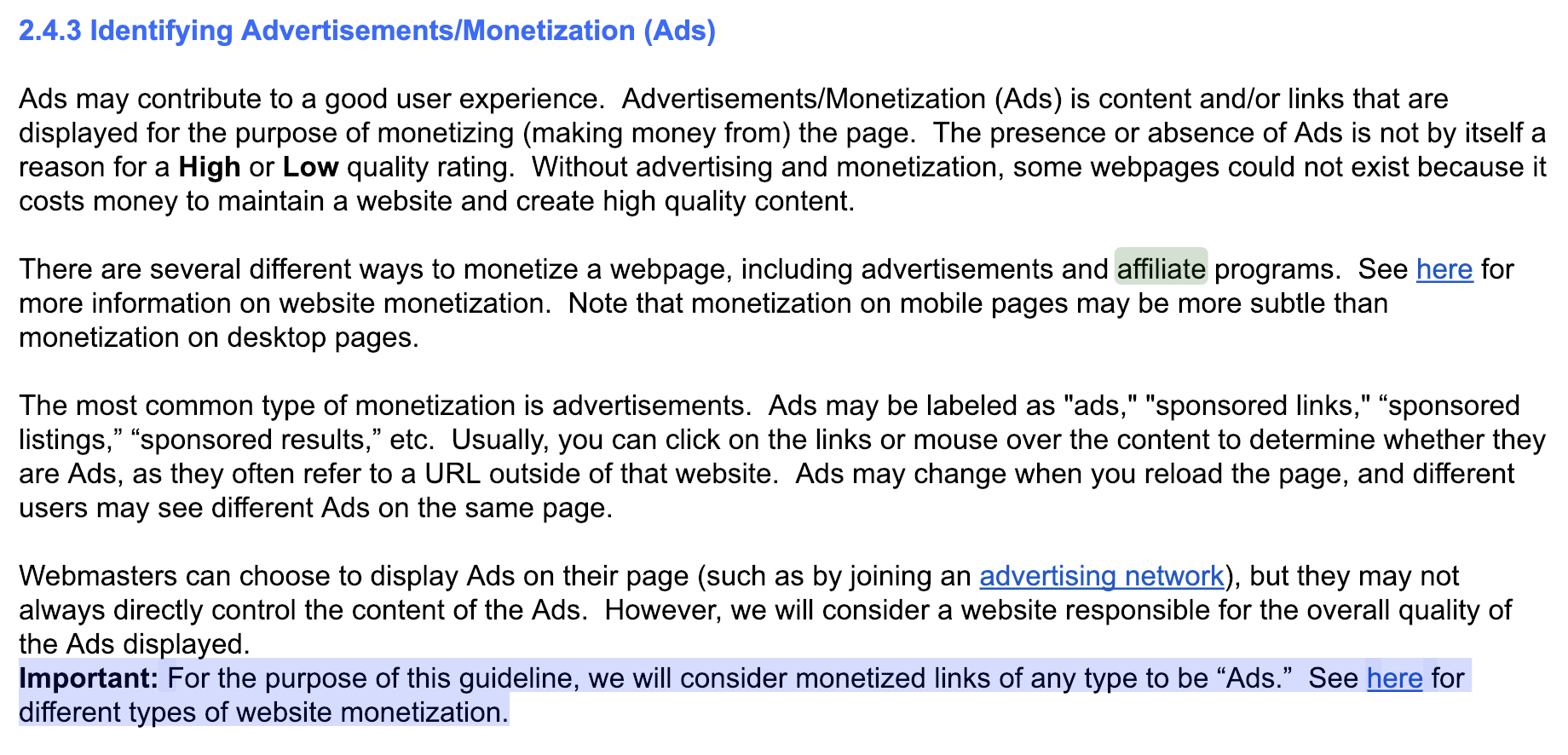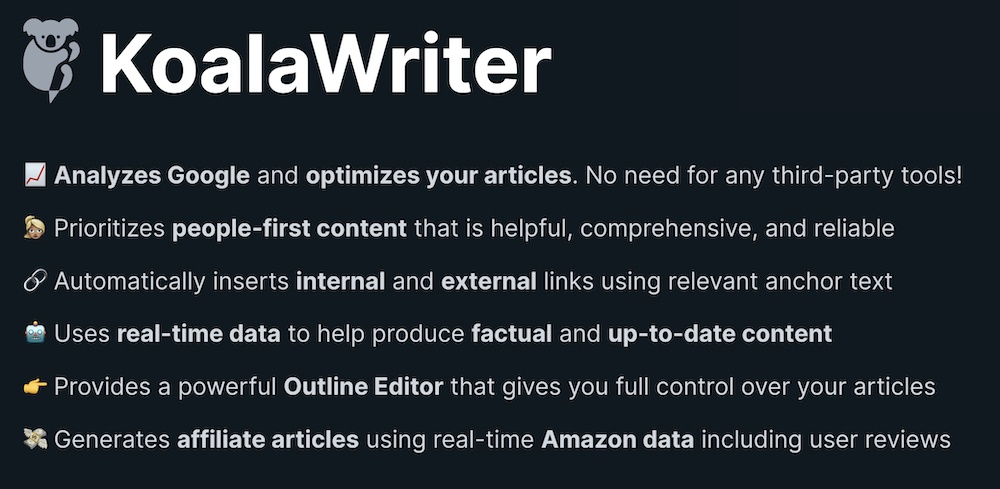Can affiliate marketing and good SEO co-exist peacefully or is there some tension, from Google’s side, towards affiliate marketers?
If you’ve ever wondered if your affiliate links are hurting your chances of ranking, keep reading as this should give you some clarity.
To give you a quick/brief answer to this:
YES, over monetization (such as too many affiliate links and/or too many banners ads) can hurt SEO.
On the other hand, Google also understands the reason people create content is because they expect to make money with it.
If there were no way to monetize content (even the content that dominates Google’s first page), there would be very little incentive for content creators to keep coming up with great, helpful, and entertainment information.

How Can You Do Affiliate Marketing (Without Hurting Your SEO)?
How can we find a balance so you can safely and profitably use affiliate links and still hold a significant pull on Google’s search results?
I’ll discuss that in this article, but first, here’s this golden nugget taken from Google’s own published guidelines for quality checkers at Google’s HQ.

Sidenote: This document – which was intended to stay within Google’s web-spam team leaked to the masses some time ago, which clearly reveals what content Google likes to rank and what content it tends to ignore. After a while, Google came out and confirmed that this document came from them and yes; the guidelines are exactly how they operate their search results.
Google Sees Affiliate Links & Pages as “Ads”
Now while they do not specifically say the search results have should not contain any content marked as “ads” – we also know there is plenty of content – with ads – ranking high on page 1.
We know this because most of the pages you click through from Google has some form of ads on there.
So, while Google may or may not be opposed to ads on pages, they sure allow it to rank. So with regards to affiliate marketing, it’s safe to say they have no specific ban on it.
So when does affiliate marketing hurt SEO?
The problem – as I see it and as many other SEO experts see it – is that affiliate marketing will only hurt your rankings if you overdo it.
Just like with any other monetization method (not just affiliate marketing), if you decide to overdo it with your affiliate links; then yes;
Affiliate marketing can hurt your SEO.
Not in the way that Google would take manual action to devalue your site out of spite, but the algorithm would simply prefer and give that little-added boost to content that does not overdo it with ads (and affiliate links).
If you think about it, it rarely ever happens that you click on any of the top 10 results, and you land on a site that’s overly monetized with ads everywhere and affiliate links in every sentence, right?
Exactly.
Of course, as with everything related to SEO;
This also depends on the search.
If the keyword you are trying to rank for is a buyer-keyword, Google tends to be more lenient towards having affiliate links present on the content.
An example of “buyer-keyword” would be:
- Where to buy a flatscreen TV
- The best home cookers to buy
- Where to buy acting courses online.
These keywords are buyer-keywords, so it makes sense, and it’s quite helpful to the readers for the content to have affiliate links placed in there that give the readers an opportunity to buy if they so desire.
On the flip side, content not based on a “buyer keyword” would likely not require affiliate links to be present thus, Google may prefer content without affiliate links.
What you have to keep in mind here is that there are 200+ ranking factors that determine the rank of a page on Google so this is not a make-or-break rule in any way.
Next, I will share with you some things you should keep in mind regarding SEO and affiliate marketing if you’re planning on starting your website.
I have come across such realizations from my personal experiences and have confirmed them with people much smarter than me so I am sure they will be helpful for you to keep in mind.
Things To Keep In Mind With Affiliate Marketing & SEO
Do Not Monetise From Day One
One thing I like to advise my students is to not monetize your website from the very first day you launch it.
If you’re starting a brand new website, there is no reason why you should have affiliate links on there since most likely; very few visitors will stop by your blog in its early days.
For my own niche site projects, I try to keep the website “clean” from affiliate links for as long as possible.
Once I have the traffic – which it’ll mostly be coming in for one or two posts – I monetize that specific post only, which brings me to my next point:
Let A Post Reach It’s Resting Rank Position Before You Monetize
Even if your site is an established authority that gets a steady stream of SEO traffic, I always advise you not to place affiliate links until a post has established a firm place in the search engines.
Few know this, but it takes time for a post to find its place. When you first publish it, it will bounce around all over the place, from page 3 to page 20 and back.
This is because Google is still trying to figure out where and how this post should be placed and (more importantly) how readers are reacting to it.
You may think that Google is smart enough to figure this out quickly, but you’d be surprised to know it takes Google at least six months to give you your “resting” rank – although it will keep changing, just not with so much volatility.
(I explain why Google takes so long here).
So, the point here is that until you have found your place – or at least until your post is getting a respectable 30+ visitors or so a day, do not add any affiliate links.
Sure, you may miss out on a few random sales here and there, but it’s not worth jeopardizing your long-term rank for a short-term, one-time sale of a few bucks.
At least, that is how I see it.
Create Monetized Pages & Link To Them
Another method I recommend often is to create review (money) pages that do have affiliate links in the content.
For example – the main course I promise on this website is the Wealthy Affiliate training course (you’ll be hearing about it soon).
Whenever I mention Wealthy Affiliate in a post, I do not use my affiliate link. Instead, I direct people to my Wealthy Affiliate review, where my affiliate links can be found.
This makes sure I have a constant flow of visitors clicking through to my review – where I can then really sell a product – and it also allows me not to have too many affiliate links plastered across every post I publish.
Of course, as mentioned above, if a specific post is getting a lot of traffic, I will then monetize it with some affiliate links, but I never overdo it.
Do Not Overdo It
As we mentioned above, Google is ok with monetizing your content as long as you do not overdo it.
If this page had an ad banner at the top, on the left and on the right, this would be me overdoing it with banner ads and no; this post would not rank well at all.
With affiliate links, you should not overdo it either.
I live by this rule:
Only two affiliate links per 1000 words.
You should be writing at least 1500+ words per post, so 2-3 links on a page like that would be enough – overdo it and you will have problems.
Monetize With Email Marketing
Last but not least, I want to mention a tip I picked up from one of my mentors and that is to focus your affiliate marketing efforts on email marketing.
You can collect subscribers by installing a sign-up form on your website and through your emails you can use affiliate links as much as you please and that would not hurt your SEO.
Obviously, you do not want to overdo this either, as that will piss off your subscribers.
It’s a good way to go about it and it’s a strategy I am using with my newsletter. It’d be wise to utilize this in addition to the methods I described above.
Does Affiliate Marketing Hurt SEO? Final Verdict
Only if you overdo it.
Affiliate marketing provides a way for people to monetize their content so whether Google likes it or not, that’s how it has to be.
Sure, things may change in the future, but you have nothing to worry about for now, so go ahead and start your affiliate marketing business already – no more excuses.
If you don’t know how, look at my free guide explaining how I make money with simple affiliate websites.
